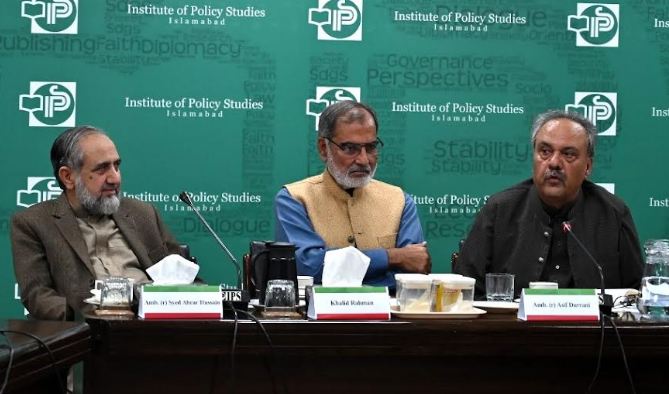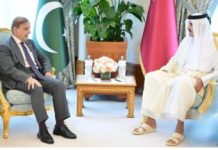ISLAMABAD, FEB 3 /DNA/ – Restructuring Pakistan-Afghanistan relations requires a departure from short-term policy fixes toward a comprehensive, strategic, and governance-driven approach. Since the erosion of the rule of law and the spread of divisive rhetoric fuel mistrust and instability, this approach must prioritize mutual recognition of sovereignty, the rejection of polarizing narratives, the restoration of the rule of law, public ownership in law enforcement, and institutional integrity.
The views were reflected during a discussion followed by the keynote speech of Ambassador (r) Asif Durrani, Pakistan’s former special representative on Afghanistan, in a roundtable on “Geopolitical Imperatives: Redefining Pakistan-Afghanistan Relations in a Post-Taliban Era,” held at the Institute of Policy Studies (IPS), Islamabad.
The session was addressed by Khalid Rahman, chairman IPS, Brigadier (r) Said Nazir, defense analyst, Noor-ul-Ain Naseem, policy advisor, GIZ, Dr Farhat Taj, associate professor, University of Tromsø, Norway, Ambassador (r) Syed Abrar Hussain, Ambassador (r) Ayaz Wazir, Dr Lutfur Rehman, an expert on FATA affairs, and other academics, former officials and policy experts.
Ambassador (r) Asif Durrani highlighted that geopolitical challenges in Pak-Afghan relations, such as the complex tribal dynamics, cross-border trade issues, and refugee management, cannot be managed through conventional diplomacy or a garrison approach. Instead, a governance-driven approach rooted in mutual recognition of sovereignty and an inclusive understanding of regional complexities is needed for lasting stability in all dimensions of this bilateral relationship.
He identified the erosion of the rule of law, amplified by the war economy of the 1990s that disrupted centuries-old trade and communal ties, as a key destabilizing factor in Pak-Afghan relations. He cautioned that governance failures, corruption, and mismanagement in areas like refugee policies, border security, and transit trade have further deepened lawlessness, making institutional restructuring imperative. To restore stability, he stressed the urgent need for institutional reforms, strengthening law enforcement through an empowered police force, and fostering public ownership of governance mechanisms.
Durrani also highlighted the detrimental impact of political narratives that fuel mistrust, with visible implications in people-to-people contact and economic cooperation. Given Afghanistan’s dependence on trade via Pakistan, he called for a pragmatic approach at both the leadership and public levels, which rejects divisive rhetoric and views bilateral relations as a strategic strength.
Endorsing this, the speakers noted that Pakistan-Afghanistan relations have long fluctuated between confrontation and appeasement, neither of which has delivered sustainable stability. For this, a more balanced strategy that integrates deterrence, development, and engagement is required. The panelists also underscored the importance of a regional approach, wherein Afghanistan’s neighboring states play a greater role in trade, border management, and people-to-people connectivity. This, they argued, would ensure that Afghanistan engages constructively with the broader region.
The speakers further identified the absence of structured public discourse on Pakistan-Afghanistan policy. They called for scholarly engagement and research-driven policymaking to develop informed, long-term strategies. They stressed that both sides must acknowledge historical complexities in any policy framework to ensure a people-centric approach that moves beyond reactive political maneuvering and fosters mutual trust.
In concluding remarks, Khalid Rahman emphasized that the blame game is counterproductive and does not resolve longstanding issues. He pointed out that poor governance lies at the heart of bilateral challenges, and without addressing this fundamental issue, policy measures will remain ineffective. He further noted that projecting a positive narrative focused on mutual strengths is critical. He stressed both countries must prioritize good governance, institutional stability, and a well-defined national narrative to foster regional stability and cooperation.












